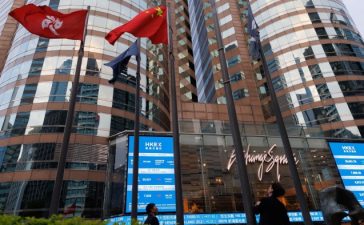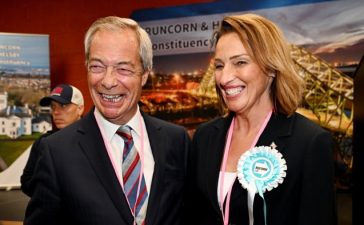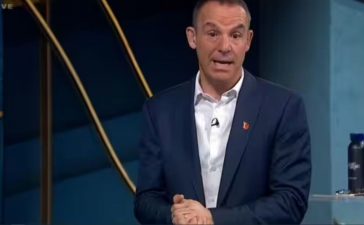Rayner accuses Tories of taking ‘sledgehammer to foundations on which good life can be built’
Angela Rayner, the deputy Labour leader, used her speech to restate Labour’s intention to deliver “the biggest boost in affordable and social housing for a generation”. She said this would include council housing.
The Tories look down on people living in social housing.
Well I say, let’s stare right back.
And never be ashamed.
A council house changed my life.
And so here’s what Labour is going to do.
We’ll start by salvaging the system that the Tories have taken a sledgehammer to.
Where the Tories have snatched billions from affordable housing, Labour will unlock government grants to deliver new homes by making the affordable homes programme more flexible so that every penny gets out the door to build the homes people need.
And by working with the local leaders – who know their areas best – we’ll use these funds more effectively.
Rayner also said secure, affordable housing was one of what she described as the foundations of a good life. Under the Conservatives, these were crumbling, she said.
Rishi Sunak and his party have taken a sledgehammer to the foundations on which a good life can be built.
And now the simple things in life are crumbling.
A decent job.
A secure, affordable home.
And a strong community.
Simple things this government has snatched away from working people.
Conference, we can’t go on like this any longer. The Tories are not only talking Britain down. They’ve dragged us down. And they’re holding us back.

Key events

It is hard to avoid the union jack in Liverpool. Even if Nigel Farage had been in charge of the decor, it is hard to imagine it could have been used more. Most parties are keen to be seen as patriotic, but in part this is also part of an ongoing effort to draw a line under the Jeremy Corbyn era, which is something the Tories won’t let Keir Starmer forget. In his conference speech last week Rishi Sunak referred to Corbyn’s views on Nato and nuclear deterrence, and Starmer’s support for him, adding: “You can never trust Labour with our country’s security.”
In the press room at the conference officials have just been handing out examples of the redesigned party card, which is big on the red, white and blue. The back of the large, in large type, carries the words “Putting the country first”. The Blair-era clause four is there too, in much smaller type.

And Robert Jenrick, the immigration minister, has also criticised Keir Starmer for saying he would get rid of the Rwanda policy even if it were working. (See 10.04am.)
Q: Would you scrap the Rwanda policy even if it works?
Starmer: Yes.
Proof, if it were needed, that Labour don’t even want to stop the boats.
They are ideologically opposed to border controls. Their solution is to force British communities to tolerate this flagrant criminality.
Q:Would you scrap the Rwanda policy even if it works?
Starmer: Yes.
Proof, if it were needed, that Labour don’t even want to stop the boats.
They are ideologically opposed to border controls. Their solution is to force British communities to tolerate this flagrant criminality. https://t.co/bsOZenlhin
— Robert Jenrick (@RobertJenrick) October 8, 2023

Rajeev Syal
Following Keir Starmer’s pledge this morning to scrap the Rwanda scheme even if the courts give it the go ahead (see 10.04am), a government source said he was “another human rights lawyer” failing to work in the UK’s interests. They said:
Now we have the truth – Sir Keir doesn’t care about stopping the boats at all. He’d cancel our Rwanda deterrent even when it’s up and working just because it doesn’t fit with his political ideology.
Instead he plans to go cap in hand to Brussels to beg for an EU quota scheme to potentially allow hundreds of thousands more migrants into our country.
He’s just another human rights lawyer from north London who puts party interests before the British people.

Neil Kinnock and Alastair Campbell urge Labour delegates to vote for debate on Brexit

Ben Quinn
The former Labour leader Neil Kinnock has joined campaigners urging delegates at the party conference to back a motion calling for a future government led by Keir Starmer to negotiate a closer EU-UK relationship.
The motion from the Labour Movement for Europe, which calls for the party to make commitments including negotiating a visa system with the EU, is among those being put to a ballot today on whether they can go to a vote and debate on the conference floor in Liverpool this week.
Kinnock said in a video message posed online:
Everyone knows that Brexit has inflicted, is inflicting, terrible costs and losses on our economy and it has diminished our country internationally. Obviously Labour wants to change that bleak reality and part of doing that should involve discussing it at our conference.
So please vote with the Labour movement in Europe and others in giving priority for debate to the European motion.
Supporters of Keir Starmer, the Labour leader, have been canvassing delegates to vote for different motions to be debated on the conference floor.
Alastair Campbell, the former Labour communications and strategy chief, also backed the motion in a video posed by the Labour Movement for Europe, in which he called for a “proper debate” on Brexit. He said:
This is the week Labour can show they are very very different to the Tories on so many fronts.
Today @campbellclaret is urging delegates at labour conference to use the opportunity to show we are serious about tackling the damage Brexit is doing to our economy and our country – please vote for Europe in the priority ballot and share this post pic.twitter.com/r1zVdda2Zg
— Labour Movement for Europe

(@labour4europe) October 8, 2023
Delegates will vote this afternoon for the topics that will be debate. There are 49 topics on the list, and 12 will be chosen.
Rayner accuses Tories of taking ‘sledgehammer to foundations on which good life can be built’
Angela Rayner, the deputy Labour leader, used her speech to restate Labour’s intention to deliver “the biggest boost in affordable and social housing for a generation”. She said this would include council housing.
The Tories look down on people living in social housing.
Well I say, let’s stare right back.
And never be ashamed.
A council house changed my life.
And so here’s what Labour is going to do.
We’ll start by salvaging the system that the Tories have taken a sledgehammer to.
Where the Tories have snatched billions from affordable housing, Labour will unlock government grants to deliver new homes by making the affordable homes programme more flexible so that every penny gets out the door to build the homes people need.
And by working with the local leaders – who know their areas best – we’ll use these funds more effectively.
Rayner also said secure, affordable housing was one of what she described as the foundations of a good life. Under the Conservatives, these were crumbling, she said.
Rishi Sunak and his party have taken a sledgehammer to the foundations on which a good life can be built.
And now the simple things in life are crumbling.
A decent job.
A secure, affordable home.
And a strong community.
Simple things this government has snatched away from working people.
Conference, we can’t go on like this any longer. The Tories are not only talking Britain down. They’ve dragged us down. And they’re holding us back.

Angela Rayner started her speech with a series of jokes about Tory MPs. Here are some of the better ones.
Then there was the home secretary, sacked as a threat to national security. The same home secretary, reappointed the next week.
I think they call that “time served”. Apparently she believes in the rehabilitation of offenders after all.
Now we have the prime minister refusing to hand over his WhatsApp messages.
I assume Jacob Rees-Mogg has also refused to hand over his carrier pigeon.
Throughout all of it, the prime minister simply can’t stand up for the country against his party.
Apparently he’s planning another reshuffle. Maybe that’s why he thinks we were offering him seven different bins for different kinds of rubbish …
The prime minister’s speech didn’t even mention “housing” once. No doubt that’s because his housing policy is the same as his new smoking policy – increase the price year on year, so eventually no one can buy!
Mandelson says Unite leader right to say Labour must be bold – but ‘not bold and stupid’
In an interview with the Observer, Sharon Graham, the leftwing Unite general secretary, says Labour must be bolder. She says:
I know that it’s an unpopular thing to say at the moment, because everybody feels we should just batten down the hatches. The problem with that is that they [Labour] can afford to be bolder – and I don’t think they can afford not to be.
There’s one thing to get in [ie win the election] and [another to be] literally carried in – carried through those gates because you’re going to make the change that we need. I don’t want apathy to be the winner of this. It’s got to count.
Peter Mandelson, the arch-Blairite who is about as far on one wing of the Labour party as Graham is on the other, told Sky News this morning that the Unite leader was right about the need for bold policies. But that did not mean being “bold and stupid”, he said, in a reference to some of the left’s nationalisation demands. He said:
I agree with Sharon Graham. I agree that we need more than policy tweaks and we need more than small twists in the policy dial.
Yes, I’m happy to be bold, but not bold and stupid.
I’m going to be campaigning for a Labour government that’s going to invest in home insulation, that will create energy, security and efficiency in people’s homes.
I’m going to be campaigning for a Labour government that’s going to get British workers building electric vehicles.
I’m going to be campaigning for a Labour government that’s going to get steel workers making green steel, not passing £96bn worth of public funds to the shareholders in BP and other energy companies.

Angela Rayner addresses Labour conference
At the Labour conference Angela Rayner, the deputy leader, is addressing the conference now. Shadow cabinet ministers have been told this year to keep the attacks on the Conservatives to a minimum, and focus more on what Labour would do in office, but the deputy leader’s speech at conference is always expected to be a carnival of Tory-bashing and Rayner is obliging very successfully.
I will post the highlights when I see the full text.
As Chloe Chaplain from the i, the hall is packed – which is not normally the case at conference on a Sunday morning.
Labour conference hall absolutely rammed for Angela Rayner’s speech – people being turned away at the door
It is a hard job writing up polling these days for the pro-Tory Mail on Sunday, but they are a resourceful bunch over there and not easily deterred. Today’s write-up of a Deltapoll survey is headlined on Rishi Sunak being trusted on “a woman is a woman”. That’s a line he used in his conference speech, and the story says the polling shows 35% of respondents agree that a woman is best defined as a human with female biology, while only 14% say a trans woman for a woman. The story describes this as a boost for a Tory attack line, which is arguably true.
The sub-heading to the story also says the poll shows that Keir Starmer is seen as “Mr Flip Flop”, another Tory attack line, because of his U-turns. Also true – up to a point.
But, as the story concedes a bit further down, Sunak is also seen as a flip flopper.
And the actual figures show that, on this measure, Sunak is seen as far worse than Starmer. Fifty-three per cent of people say he “changes his mind and flip flops”, while only 32% says he “sticks to the decisions he has made”.
For Starmer, 42% have him as as a flip flopper, and 37% say he sticks to the decisions he makes.
The poll also suggests that 35% trust Starmer to protect the rights of women and girls, while only 25% say the same of Sunak – which rather undermines the point made in the headline.

Starmer says increasing growth will be ‘the central mission of incoming Labour government’
Here are the main points from Keir Starmer’s interview with Victoria Derbyshire on the BBC.
-
Starmer said increasing growth was “the central mission of the incoming Labour government”. When it was put to him that getting the highest sustained growth in the G7 was one of Labour’s five missions, Starmer said it was more important than that. He said:
It is the central one. It is not just one of them. It is the central mission of the incoming Labour government.
I’m confident because we’ve got a strategic plan. I’m confident because I’ve listened to businesses who say to me these are the impediments in my way. I’ve said to businesses, look at infrastructure, how long would it take you, for example, to build a windfarm? I’m told about two years physically, but about 13 years before we actually get any power out of it.
That means we got to go at pace to deal with the planning that sits in the way of it, go at pace to deal with the grid, which is far too slow.
So my confidence comes, not from coming on here and simply asserting it … but because of months and years of careful conversations with those that will be delivering this.
-
He said Labour would get rid of the Rwanda deportation plan, even if it appeared to be working by the time of the election, because it was the “wrong policy”. (See 10.04am.)
-
He said he thought doctors would be willing to do more paid overtime to clear the hospital operation backlog, saying they were “up for this because they know that bringing down the waiting list will reduce the pressure on them in the long run”. He was referring to a Labour plan announced this morning for 2m more operations or appointments in its first year. (See 8.55am.)
-
He brushed aside the findings of a word cloud exercise showing that “Nothing” was the reply given most often when people were asked what word they associated with him. (See 10.17am.) Shown the picture, he replied: “I’ve had a lot worse thrown at me in my life”. He also said people knowing little about him showed why the conference was so important.
This is an appalling attack on Israel, a terrorist attack, for which there is no justification. The perpetrators of this have deliberately pushed back the prospect of peace agreements.
Starmer also said he spoke to the leader of the Israeli Labour party, Merav Michaeli, last night. He continued:
As we were on the phone the siren went off and she had to go down into her shelter, taking her papers with her. So it’s an appalling act of terrorism, it needs to be called out across the world.

Here is a cleaner version of the Keir Starmer word cloud shown on the BBC. It is more positive than the one for Rishi Sunak, which was dominated by the word “Rich”, or phrases containing it.
Is being associated with the word “Nothing” better than being associated with the word “Rich”? Not if people are saying the word nothing to mean worthless, but almost certainly people were responding like this to signal they did not have any view of Starmer because they did not know anything about him. Other answers – “Don’t know”, “Not sure”, “No idea” – confirm this.
Of the prominent words on the chart, “Himself” is probably the most damning. But some of the other main response are either factual (“Labour”) or moderately positive. “People” implies that people think Starmer is on the side of people, and “Working class” implies they think either Starmer is working class, or stands up for the working class. Focus groups suggest a lot of people think Starmer is privileged because he has a knighthood, but perhaps Starmer’s endless references to his father working in a factory, and his mother being a nurse, are cutting through.
Why Starmer said he would abolish Rwanda policy even if it were working
Labour has consistently opposed the government’s plan to deport asylum seekers to Rwanda, but generally it is done so on practical rather than moral grounds. Today, Keir Starmer continued to insist it was impractical, but he also said he would reverse it even if it were working – which sounded like a firming up of his position.
Victoria Derbyshire asked:
If the supreme court rules [the policy] is legal, and flights to Rwanda begin to take off, and the numbers crossing the Channel on small boats decline – ie, so it’s working – would you still reverse it?
Starmer replied:
Yes. It is the wrong policy. It’s hugely expensive. It’s a tiny number, a tiny number, of individuals who would go to Rwanda. And the real problem is at source.
What was interesting about this is that the obvious, and easy, answer for Starmer would have been to say that the policy won’t work. Politicians often refuse to answer hypothetical questions, and Derbyshire’s question included no less than three hypotheticals. But Starmer did not take evasive route out, and instead answered the question directly.
When Derbyshire said that promising to reverse the policy even if it were working did not sound very pragmatic, Starmer said he wanted to say “pragmatically” what he would do about this issue. He went on:
Nobody wants to see these crossings across the Channel. They will only stop if we smash the criminal gangs who are running this vile trade.
Now, before I was a politician, I was director of public prosecutions for five years. And that meant I worked with other countries coordinating a plan to smash terrorist gangs, to smash gangs that were people smuggling.
Those boats that are being used now are being made to order, they’re being transported across by gangs to the northern coast of France, and people [are] making millions of pounds, putting people in that boat. We have to break. I’m convinced we can.
You don’t start by what are you going to do at the end of the process when you’ve failed to control your borders. You start by controlling your borders.
Starmer also criticised the government for processing only 1% of small boat asylum claims from last year. He ended by saying.
As a pragmatist. I want a pragmatic plan that is actually going to fix this problem, not rhetoric, which has got this government absolutely nowhere.
In the past, Starmer has been criticised for refusing to say that Labour would repeal the Illegal Migration Act, which incorporates the Rwanda plan and gives it extra legal backing. But by willing to say today he would scrap the Rwanda policy even if it were working, he is being more robust.
That’s probably a sign of confidence. Previously some Labour strategists feared this was a Tory issue. But, as he demonstrated with the announcement of a new line on small boats during a visit to Europol last month, Starmer increasingly seems to view this as Labour territory.

Derbyshire ends by asking Starmer to name one thing about Rishi Sunak he admires. Last week, Laura Kuenssberg asked Sunak to say something positive about Starmer (without getting much of an answer).
Starmer says he appreciates that fact that, on the day he became PM, Sunak called Starmer and they agreed that, although they would criticise each other on policy, on matters of national security and terrorism they would stand together.
Derbyshire presents Starmer with a word cloud showing what voters make of him.
“Nothing” seems to be the most prominent reaction. Other words that have come up often are “Don’t know”, “Not sure”, and “Himself”.
Starmer says he has been called worse.










